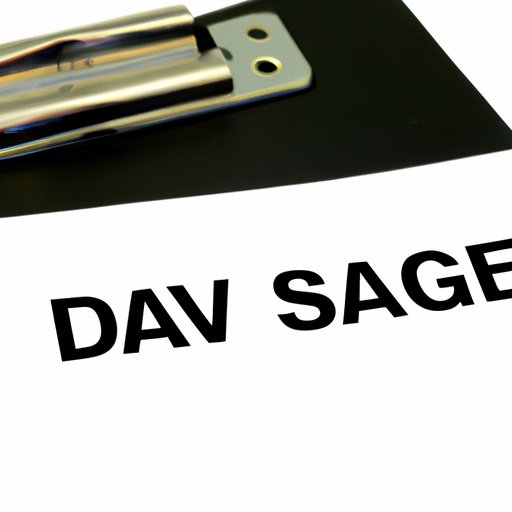
I. Introduction
When a vehicle sustains severe damages from an accident or natural disaster, it is often given a title called a “salvage title.” This title indicates that the vehicle is no longer in good condition and may be considered unsafe for use on the road. However, it is possible to get a salvage title cleared with the right steps. In this article, we will explore how to get a salvage title cleared and why it’s important.
II. Go Through the State DMV
The first step in clearing a salvage title is to go through your state’s Department of Motor Vehicles (DMV). You can contact the DMV by visiting their website, calling their office, or visiting them in person. It’s important to understand your state’s rules and regulations to ensure you follow the proper process for clearing a salvage title through the DMV.
The process for clearing a salvage title through the DMV may vary depending on where you live. However, some common requirements and documentation needed may include proof of ownership, photographs of the damaged vehicle, receipts for repairs, and an inspection report. It’s important to clarify with the DMV what specific documents they require to clear your salvage title.
III. Reach Out to an Attorney
In some cases, it may be necessary to seek legal help when getting a salvage title cleared. A good attorney should have experience in handling salvage title cases and should be able to provide guidance on the process. Having legal representation can also give you peace of mind knowing you have someone to help you navigate the process.
It’s important to note that hiring an attorney can be costly. You should do your research and consider the costs of hiring an attorney versus the potential benefits of having one on your side.
IV. Get the Vehicle Checked
If you decide to pursue clearing your salvage title through the DMV, you will likely need to have the vehicle checked by a professional mechanic. This step is crucial because a mechanic can diagnose any issues with the vehicle that may affect its safety and performance.
When a car has a salvage title, it may have a variety of issues such as engine damage, frame damage, or airbag deployment. The mechanic’s report should contain a list of any issues found and an estimate of how much it would cost to repair them.
If your vehicle needs repairs, you should consider your options for paying for them. You may be able to pay for repairs out of pocket, submit a claim to your insurance company, or finance the repairs through a lender.
V. Get Insurance
A crucial aspect of the salvage title clearing process is obtaining insurance for the vehicle. Depending on your state’s laws, you may need specific types of insurance policies to ensure your vehicle is covered while it’s being repaired or inspected.
It’s essential to shop around for the right insurance coverage that fits your needs and budget. You may want to consider factors such as your driving record, the type of vehicle you own, and your desired level of coverage when choosing an insurance provider.
VI. Complete All Paperwork
Clearing a salvage title requires specific paperwork to be completed by both the seller and the buyer. It’s essential to understand the responsibilities of each party to ensure the process goes smoothly.
Common mistakes people make when completing salvage title paperwork include not filling out every section, having incorrect or missing information, and failing to submit all necessary documents. It’s crucial to keep copies of all completed paperwork for your records.
VII. Be Prepared to Pay
Clearing a salvage title can be costly, and it’s essential to be prepared to pay the fees associated with the process. Typical fees may include an inspection fee, application fee, and title fee. It’s important to note that the fees may vary depending on where you live.
If you cannot afford the fees associated with clearing a salvage title, you may need to look into alternative options, such as financing the fees or seeking assistance from a non-profit organization.
VIII. Conclusion
Clearing a salvage title may seem like a daunting task, but by following the proper procedure and seeking help when needed, it is possible. Remember to go through the state DMV, seek legal help if necessary, get the vehicle checked, obtain insurance, complete all paperwork, and be prepared to pay. Following these steps ensures a smooth process and gives you peace of mind knowing your vehicle is safe and ready for use on the road.
Remember, it’s important to be patient and follow the necessary steps when clearing a salvage title. Rushing the process can lead to mistakes that could cost you time and money in the long run. By following the tips outlined in this article, you can get your salvage title cleared and get back on the road safely.





